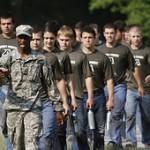Wise leaders are able to obtain a moral outcome in spite of significant obstacles (Sternberg, 2003). One example is Nelson Mandela, who forged South Africa’s future on the platforms of forgiveness, honesty, disclosure, and mutual support.
Mandela felt that the censure and retributive justice which his countrymen desired would only serve to deepen the wounds that divided South Africa. Gandhi, Mandela, and Martin Luther King all engendered a mutual laying down of arms through their choice of non-violent opposition. In holding themselves accountable, these leaders ensured that love would be their spiritual legacy. They did not forge bonds of relationship so that they could achieve immortality. Rather, they nurtured them so that others would be able to realize the immortal within themselves.
“The dignity of the human person is a transcendent value, always recognized as such by those who sincerely search for truth. To promote the good of the individual is thus to serve the common good, which is the point when rights and duties converge and reinforce one another” (Pope John Paul, 1999).
This semester, my RODP (Regents Online Degree Program) Principles of Management students responded to the following question: How do you wish for your manager to treat you at work? In what ways can he/she empower you? Below are pearls of wisdom from some of my stars:
In a work environment I want to be valued, trusted, and treated with respect. I want to be respected by my manager as an employee and an individual. I want my manager to be respectful when asking me to do a task, discussing a problem, or talking about other employees. I also want a manager to view me as a valuable asset to their team. I do not want to feel like I’m disposable. My manager can empower me by showing that they respect me. I thrive in an environment where I know that I am a trusted, valued, and appreciated. I am empowered when I finish the work that I’m given, knowing that I did the best job that I could. I can also be empowered by being rewarded for my hard work. [Lacey Shelton]
It is very liberating to know that you are trusted and respected by your organization. This allows for the freedom to make the tough calls without hesitancy or fear of reversal. [Ames Hill].
In order to lead one must realize…that the followers have more to their life than just the organization in which they are employed. [Cameron Lawson].
Conflict occurs when managers only focus on the final product, instead of their employees’ involvement in producing it, whatever the product may be. Jim Holland (2011) states that leaders today should be “well organized, good delegators, possess good human insight, be willing to take criticism, and last but not least, they should be flexible.” [Connor Barnes].
______________________________________________________________________-
References
Pope John Paul II. (1999). World Day for Peace, no #2.
Sternberg, R. J. (2003). WICS: A model of leadership in organizations. The Academy of Management Learning & Education, 2, pp. 386-401.





Recent Comments